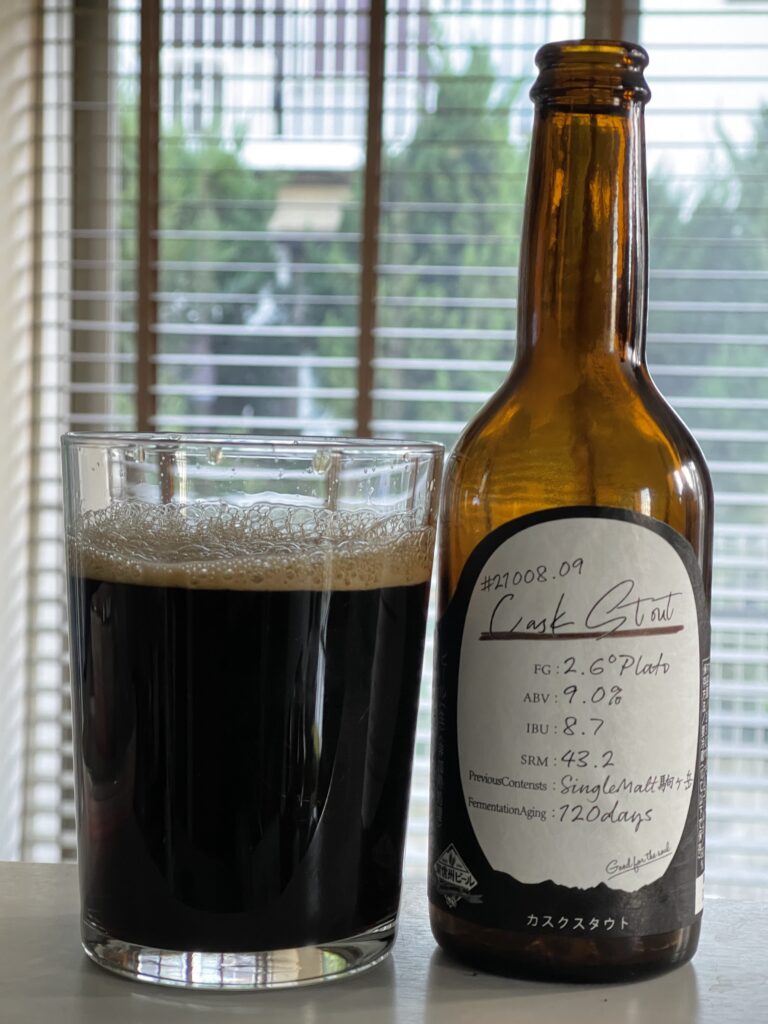Minamishinshu Cask Stout is a 9% imperial stout from Komagatake Brewery, based in Komagone, in Nagano, Japan. It’s part of their winter seasonal lineup, and can be found in both bottles and on tap. It’s labelled as being matured for almost two years (720 days) in wood casks that once contained a single malt whiskey from Hombo Shuzo Mars Shinshu Distillery and also states as “being good for the soul” – and as a lover of imperial stouts, who am I to disagree?

Basics
- Alcohol : 9%
- Style : Imperial Stout
- Hops : Unknown
- IBU : 8.7
Sale Information
- Availability : Winter seasonal
- On Sale : From Winter 2021
- Size : 330 ml
- Price : From 900 yen
Aroma & Taste
- Notable Aromas : chocolate, coffee, caramel, whiskey notes of peat and earth.
- Notable Tastes : smooth chocolate and coffee, with restrained whiskey notes. Low alcohol heat.
Minamishinshu Cask Stout : Aroma & Taste
In spite of the label stating that the SRM, a scale used to indicate the colour of a beer, was 43.2, Minamishinshu Cask Stout poured out a much darker colour than I expected. It was definitely a black colour, if not a very, very, very dark brown colour when held up to the light.
Minamishinshu Cask Stout excelled in the nose though with an all round balanced aroma that sometimes gets forgotten when beers get barrel aged in whiskey, especially for beers that are aged for a longer period of time. The beer was malt forward, with chocolate and coffee being the main malt aromas, but as Minamishinshu Cask Stout warmed up, some typical whiskey notes came through: the peat and earthiness was unmistakably there, but didn’t dominate over anything else. There was also some caramel aroma that just peaked through when warm.
The body was a delight to drink, especially as the weather took a turn for the winter at the end of November. The coffee and chocolate, like in the nose, were the main flavours that came through, but neither were cloying or dominating over other flavours. It was the whiskey notes that came screaming through, like a toddler charging towards its favourite parent, to let know they were there. The peat and earth tones were warming, but there was also some hints of woodiness from the beer – possibly oak but I wouldn’t bet my house on it.
At 9%, there was a tad of alcohol heat to the beer in the end, but it was smooth and helped support the other flavours by warming up the palate.
What’s In A Colour?
SRM, the Standard Reference Method, is scale that ranges from 0 to around 80, that indicates the colour of a beer; the higher the number, the darker the beer.
It’s a simple method of passing a beam of light (at 430 nm wavelength) through 1 cm of beer and measuring attenuation of the light. The 430 nm light used corresponds roughly to a blue-violet light.
There is also the EBC, European Brewery Convention, and Lovibond scales, but that’s for another day.
Minamishinshu Cask Stout finished off with a smooth lingering coffee and chocolate flavout with the aforementioned whiskey heat just finishing up the party in the glass – leaving me feelling all cosy and warm on a cold November night, waiting for the heater to come on to finish the job and send me to sleep.
Minamishinshu Cask Stout : The Bottom Line
If you hadn’t had guessed by now, I really liked Minamishinshu Cask Stout and would happily recommend it to others – if you can find it that is.
Minamishinshu Cask Stout : Where to Buy It
Minamishinshu Cask Stout can be bought online at the following places: